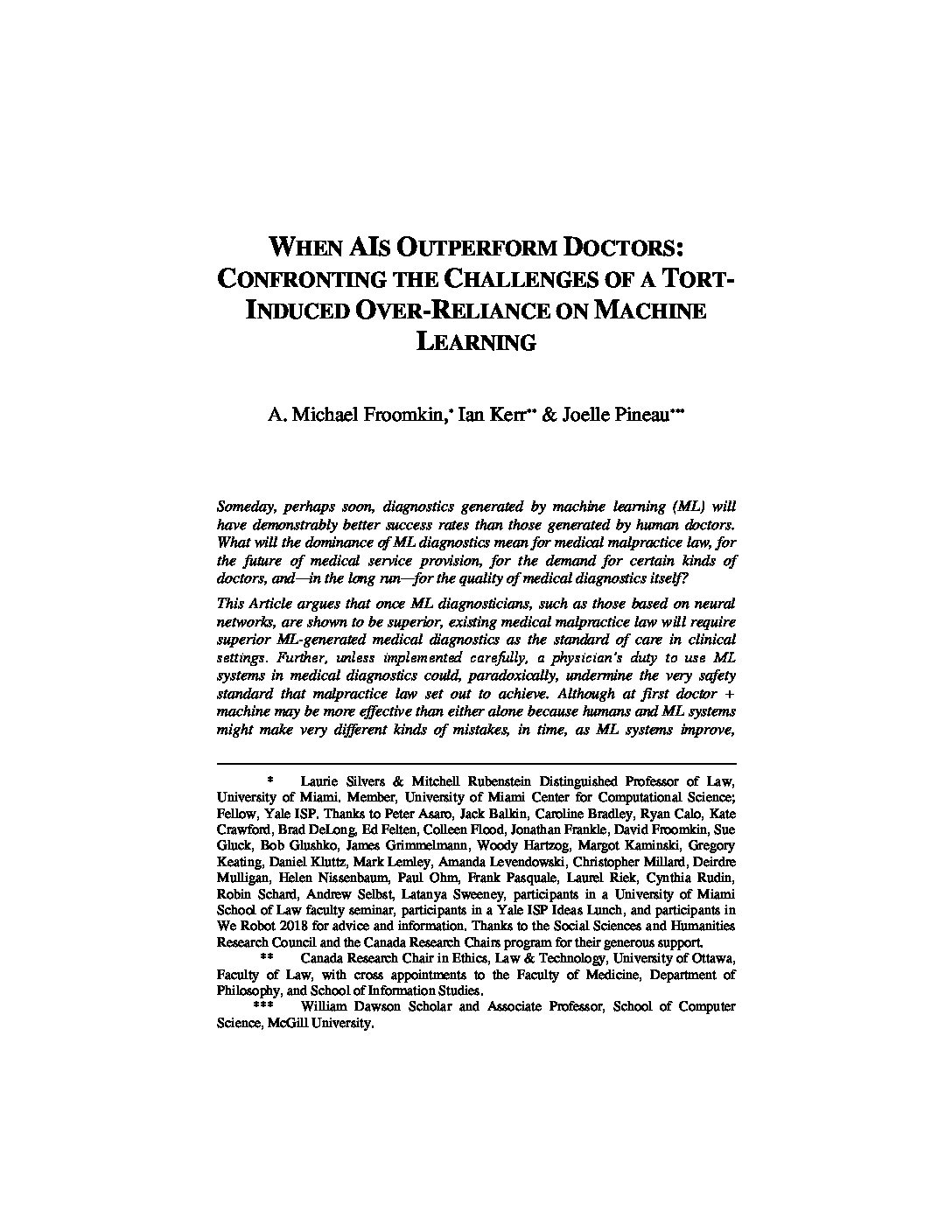 I’m happy to report that the Arizona Law Review has published When AIs Outperform Doctors: Confronting the Challenges of a Tort-Induced Over-Reliance on Machine Learning, 61 Ariz. L. Rev. 33 (2019), that I co-authored with Ian Kerr (U. Ottawa) and Joelle Pineau (McGill U.).
I’m happy to report that the Arizona Law Review has published When AIs Outperform Doctors: Confronting the Challenges of a Tort-Induced Over-Reliance on Machine Learning, 61 Ariz. L. Rev. 33 (2019), that I co-authored with Ian Kerr (U. Ottawa) and Joelle Pineau (McGill U.).
Here’s the abstract:
Someday, perhaps soon, diagnostics generated by machine learning (ML) will have demonstrably better success rates than those generated by human doctors. What will the dominance of ML diagnostics mean for medical malpractice law, for the future of medical service provision, for the demand for certain kinds of doctors, and—in the long run—for the quality of medical diagnostics itself?
This Article argues that once ML diagnosticians, such as those based on neural networks, are shown to be superior, existing medical malpractice law will require superior ML-generated medical diagnostics as the standard of care in clinical settings. Further, unless implemented carefully, a physician’s duty to use ML systems in medical diagnostics could, paradoxically, undermine the very safety standard that malpractice law set out to achieve. Although at first doctor + machine may be more effective than either alone because humans and ML systems might make very different kinds of mistakes, in time, as ML systems improve, effective ML could create overwhelming legal and ethical pressure to delegate the diagnostic process to the machine. Ultimately, a similar dynamic might extend to treatment also. If we reach the point where the bulk of clinical outcomes collected in databases are ML-generated diagnoses, this may result in future decisions that are not easily audited or understood by human doctors. Given the well-documented fact that treatment strategies are often not as effective when deployed in clinical practice compared to preliminary evaluation, the lack of transparency introduced by the ML algorithms could lead to a decrease in quality of care. This Article describes salient technical aspects of this scenario particularly as it relates to diagnosis and canvasses various possible technical and legal solutions that would allow us to avoid these unintended consequences of medical malpractice law. Ultimately, we suggest there is a strong case for altering existing medical liability rules to avoid a machine-only diagnostic regime. We argue that the appropriate revision to the standard of care requires maintaining meaningful participation in the loop by physicians the loop.
I think this is one of the best articles I’ve written or co-written–certainly in the top five. I’m particularly proud that I worked out, or intuited, a property of Machine Learning that was either not present or certainly not prominent in the literature: that if all the inputs to future generations of ML systems are due to the output of earlier generations of the ML system, there’s a chance it may all go wrong.
Reasonable people could disagree about the size of that chance, but if it happens at least with current technology there’s no way the system itself would warn us. Depending on the complexity of the system, and the extent to which doctors have been deskilled by the prevalence of the ML technology, we might be hard put to notice some types of degradation ourselves.
It would be good, therefore, to try to engineer legal rules that would make this possibly very unhealthy outcome much less likely.

 Make sure all of the following extensions are installed on all my computers
Make sure all of the following extensions are installed on all my computers However, I am now able to report that some news still shocks and surprises, such as this report from the ACLU,
However, I am now able to report that some news still shocks and surprises, such as this report from the ACLU, 

